To say that Britain had been propelled into a kind of mania in the days following the death of Her Majesty the Queen would be a bit of an understatement.
For ten days after the news broke of the passing of Elizabeth II, almost no other news or subject existed. Blanket coverage of the drawn-out rituals and observances, and of entranced or emotional masses of public mourners and pilgrims, dominated all media.
None of which was really surprising. It is more or less what you’d expect from so monumental an event – in terms of British culture and history – as the death of the Queen: particularly a monarch who has reigned for as long as Elizabeth II did and was thus so ever-present a part of our collective landscape and of Britain’s national identity or iconography.
I haven’t written this article to object to any of it: people being sad or wanting to pay their respects, for various reasons, is all fine and good. And all of the elaborate rituals and funerary observances were entirely what you would expect from the royal establishment in this scenario.
And, as this Pathé footage of the 1936 funeral of George V (the Queen’s grandfather) shows, the broad strokes of the programme are largely the same, even if various elements have been updated. There is therefore an obvious sense of continuity of national identity and/or national mythology that is served by the rituals and processions, aside from of course being a surface-level act of homage or mourning.
All of it seemed to also have unfolded in a positive communal spirit: and anything that serves to bring people in this country together for once (instead of driving them apart) is difficult to take issue with.
I mean, actually I did object to some things: such as the protester being man-handled and arrested by police for shouting out criticism of Prince Andrew, for example. But the fact that both free speech and protest seem to be under significant threat in this country under this government is a subject for a later article.
And, in truth, there are a number of subjects we could’ve brought up here in response to the outpouring of royal mania: such as revisiting some of the many curious details (to say the least) of Princess Diana’s death, asking questions about Prince Andrew’s relationship with Ghislaine Maxwell and Jeffrey Epstein, or about the royal family’s (and particularly Charles’s) relationship with Jimmy Saville, or asking questions about money laundering and corruption on the Crown-controlled tax-haven island of Jersey (as well as longstanding evidence of child abuse on the same island).
But, you know, I’ve covered most of those things before: and now probably isn’t the time.
I might return to some of those things soon: but I respectfully waited for the official period of national mourning for the Queen to pass before publishing even this article.
I generally don’t like to speak disrespectfully of the recently departed: and, in truth, I never really had any substantial issues against the person of Queen Elizabeth II anyway. As hereditary monarchs go, Elizabeth II was almost a best-case scenario.
To be clear, I am neither a monarchist nor particularly as anti-monarchy as I might’ve been when I was younger. As with a number of supposedly ‘hot button issues’ in modern life that other people consider to be divisive or all-consuming, I just don’t care enough to have any passionate opinion one way or the other.
I was essentially the same with the Leave/Remain debate in 2016. Although I’ve always admired how the right-wing media used the Queen’s name/image to manipulate the Referendum debate: see newspaper image below. I do so admire top-quality Machiavellianism like that.
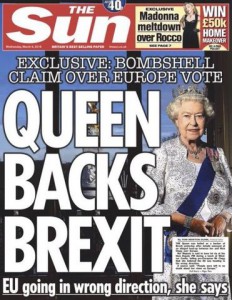
But getting back to the point, the Royal Family or the Monarchy is what it is: it’s there. It’s a part of the historical fabric of this country (or ‘kingdom’, to be more accurate). Maybe I’m a little softened by my enthusiasm for history (objectively and as a subject).
But if enough of the population is passionately royalist – and this certainly appears to be the case, if the last few weeks is anything to go by – then the argument can certainly be made that the monarchy has a legitimate place in modern life.
And not by ‘divine right’, but by apparent public consent.
In other words, the degree and sheer scale of apparent public mourning for the Queen, public support for royal spectacle and general public fascination with the royal family, *strongly* suggests that the British people have been expressing their overwhelming *consent* to the monarchy: that the British population has, in the last two weeks, passionately endorsed and embraced monarchy.
In effect, that means embracing both the royal establishment and the broader elite system that the royal family is embedded in. The message seems to be clear – Britain is a monarchy and we are, broadly speaking, happy with that. Or am I missing something?
As I noted in the short video I put up a few days ago, I say that without making any value judgement: it is simply drawing objective conclusions from what we have observed in the past fortnight.
If there’s a counter-argument, it would be tempting to argue that a lot of this was media and state sleight-of-hand: that we were being presented a skewed perspective in order to suit an Establishment agenda. Certainly the media overwhelmingly positioned itself as pro-monarchist in the last couple of weeks: and presented an entirely uniform portrayal of the subject, with no room for dissent or questioning.
The media has, in essence, been walking entirely in lock-step with Establishment needs.
Which makes sense, of course, as we know that the event of the Queen’s death has been rehearsed over and over again, right down to the smallest detail: and this pre-scripted, pre-planned programme would certainly include what the media coverage would be like and what the media would say and not say.
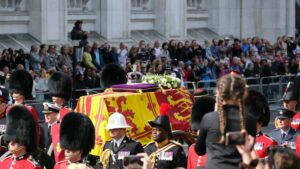
So, in essence, nothing about the Queen’s death – and the response to it – hasn’t been pre-planned: at least as far as the state and media apparatus goes.
But, even so, it’s difficult to make the case that the media manufactured the public reaction to the Queen’s passing: the media didn’t force all of those people in to those long, long queues (some suggesting up to 30 hours queuing time) to catch a glimpse of the Queen’s coffin in the Palace of Westminster. All of that was apparently genuine public feeling and genuine public desire to either witness history or pay homage.
And sure, some of it was probably people jumping on the bandwagon rather than being passionate royalists, and some of it might be just a general love of spectacle and pageantry: but, either way, it’s still an endorsement of monarchy – and the public part of it wasn’t manufactured, but appeared mostly sincere.
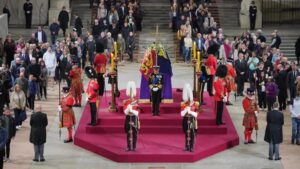
Which, it has to be said, would be perhaps Elizabeth II’s biggest accomplishment or legacy.
She has managed, two decades into the twenty-first century, to leave public sympathy for the monarchy in a far stronger position than it was before. Considering all the controversies of even recent years (never mind scandals of the past) – the death of Princess Diana and everything that preceded it, Prince Andrew’s dalliances with Epstein and Ghislaine Maxwell, Prince Harry’s falling out with the family, etc – this is a pretty hefty accomplishment.
The enormous amount of fondness everyone apparently has for Elizabeth II also does an enormous favour for her son, Charles, as he transitions to Head of State: making that transition from Prince of Wales to King Charles III much smoother than it would’ve been had she not been so popular (or, at least, so mourned in her passing).
Had she passed away twenty years ago, for example, when it took her five whole days to even make a public statement on the death of Diana (and even then only because Tony Blair begged her to), this might be a very different story. Public feeling (or mass hysteria – whichever you prefer) back then was very much on the side of the dead Diana: if the Queen had passed away during those years, it’s fair to say Charles would’ve had a much harder time becoming King.
And it is questionable whether the monarchy could’ve survived: it certainly wouldn’t have won in the court of public opinion.
Fast-forward two decades, however, and the Royal Establishment seems to have entirely conquered said court of public opinion: with the general public consensus seeming favourable towards it.
Evidently, a great deal of damage control and image rehabilitation has been done since then – even in spite of subsequent controversies that should’ve seen a significant dent in the monarchy’s popularity.
Most of the country – at least as far as I can tell – appears to be on the royal family’s side, for example, against the apparent pariahs Harry and Meghan. Which is interesting. Again, as with a lot of these things, I don’t care enough to have an opinion on the matter: I mean Meghan Markle is probably a bit of an attention-seeker and opportunist, but it’s still interesting how a general public that was apparently overwhelmingly Team Diana in the past is now apparently so dismissive of the son who seems to be trying to follow in her footsteps.

Again, not that I care enough to have an opinion. But it can’t have escaped everyone’s attention that the mostly right-wing media spends a hell of a lot more time attacking Harry and Meghan than it does looking into what Prince Andrew was up to with Ghislaine and Epstein.
Likewise, the media has barely ever looked into Charles’s relationship with Jimmy Saville, the allegations against the late Lord Mountbatten, or a number of other potentially damaging items relating to high-ranking royals (some of which was previously touched on in this older article).
But again, PR-wise, the House of Windsor has done an extraordinary job of improving its image – and its relationship with the general public – over the last twenty years or so. The Queen herself has been at the absolute center of that – whether or not she was its architect or whether other forces and influences were. You cannot argue with her level of popularity towards the final years of her reign: as testified to by the five-mile long queues of ordinary people waiting hours and hours in the cold just to catch a brief glimpse of her coffin.
The event of the Queen’s death itself – with all the painstakingly drawn-out ritual and near-deification – seems almost designed to cement the monarchy’s hold on the British imagination and national identity.
Curiously enough, the ending of the ‘Second Elizabethan Era’ and transition to Charles III might actually see a further change in the royals’ connection or relationship with its ‘subjects’. It can’t have escaped anyone’s attention that King Charles and the new heir-to-the-throne, Prince William, were very particular about getting close and personal with the crowds and well-wishers outside Buckingham Palace in the days after the Queen’s death: shaking hands, taking selfies, even allowing hugs.
The King even allowed one or two members of the public to kiss him on the cheek: this is all entirely new behaviour for the royal family. Neither Queen Elizabeth, Prince Philip or any of their predecessors, would’ve *dreamt* of getting that close to members of the public or allowing physical contact – the idea would’ve been unthinkable.

Not only is this new, more modern, behaviour obviously a calculated change by the Queen’s successors, designed to foster a closer connection between the senior royals and the public, but it is clearly influenced by Charles’s ex-wife and William’s mother. It was Diana who originally broke with royal etiquette by getting much closer to people in public: something that flew in the face of how things were supposed to be done.
The general consensus is (or at least used to be) that it was Diana’s wedding to Prince Charles that had reinjected ‘life’ into the royal family back in the 1980s. This was after a long time in which, other than passionate royalists, most of the general public had little or no sense of affinity for or connection to a monarchy that was seen as cold and distant.
The family was in fact seen as so aloof and removed from the common people that a supposedly groundbreaking television special in 1969 – a fly-on-the-wall documentary look at the royal household and its daily routine – was later pulled from the air by the royals because it made them look too normal (?).
I guess the Queen didn’t like that it made them seem so mundane that it threatened to remove some of the mystique or otherwordliness that the royal bloodline should have about them. I’ve checked and there’s currently a full version of that film on YouTube (see here). The odd thing is that this was exactly the programme The Firm wanted to make it in the first place: to help the common people feel more connected to them. But, evidently, they had second thoughts once they reviewed the footage.
Which just demonstrates how difficult the royals found it to connect with the people or to present themselves in some kind of sympathetic light.
Clearly, both Charles and William both decided – immediately after the Queen had passed away – to try to adopt some of this more open and less aloof behaviour that Diana had initiated decades ago.
The fact that this shift, particularly from Charles, was pretty much immediate suggests that he just wasn’t comfortable behaving that way while his mother was still alive. In fairness, Elizabeth II was naturally a product of her own parents and upbringing: and ascended to the throne in a very different era. She allowed for about as much change and ‘modernisation’ of the royal family as she could’ve been expected to during her reign: but Charles and William probably understand how the monarchy’s behaviour – and the way it is perceived by the public – needs to evolve even more if the monarchy is to survive.
And the ultimate irony is, again, that the essence of this change is probably more influenced by Diana than Charles would ever comfortably admit.
It appears that, for better or worse, the monarchy is probably here to stay. And that we are, at heart, a pro-monarchist country on the whole. Which makes us, in essence, a pro-Establishment country and a country that generally accepts the class system and generally defers to its elites.
Again, not necessarily surprising: but the past two weeks proved to be instructive and educational, in terms of understanding what the core or prevailing British mindset is.
Again, for better or worse, I don’t know. It just is what it is.
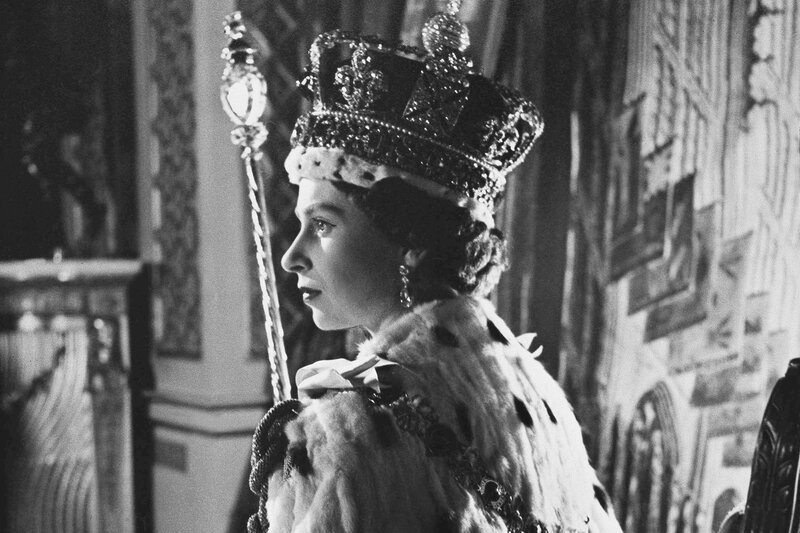
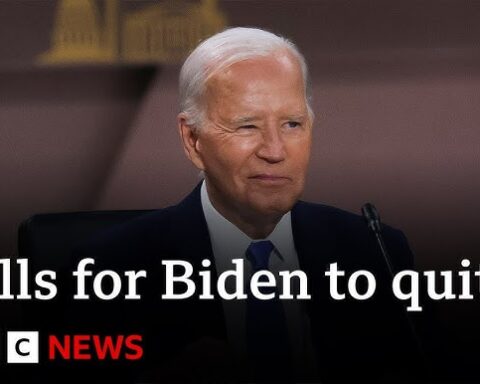
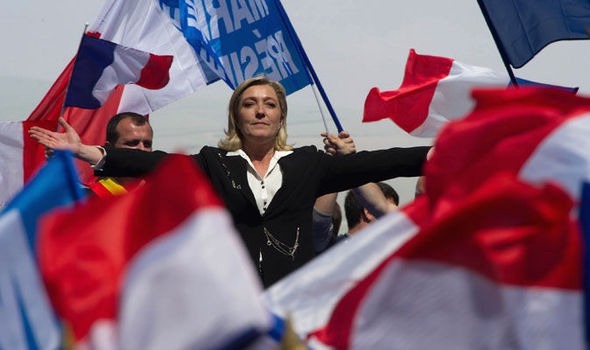


I think you’re an excellent writer – you provided a balanced and thought-provoking analysis.
The only thing that I would add is this:
Prince Harry and Meghan Markle left because the monarchy would not provide bodyguard protection for their baby son – the first person of color in the Royal Family. That is shocking given the racist bullying that Meghan suffered since she started dating Prince Harry.
As you yourself admitted, the British tabloids have been unrelenting in their vitriol toward Meghan from the very beginning. This racism that these rags have fomented is extremely dangerous to the personal safety of their son. If I were them, I would have also left the UK.
What was absolutely alarming was when the Royal Family withdrew bodyguard protection from Prince Harry – IN THE BEGINNING OF THE PANDEMIC – WHEN THEY WERE IN CANADA – WITH THEIR ADDRESS PUBLICIZED ONLINE.
Did the Royal Family not remember what happened to Princess Diana and the paparazzi? Or was that the RF playing hard ball, no matter the consequences?
If it had not been for Tyler Perry, the American actor, screenwriter, and film studio owner, Prince Harry and Meghan would not have had safe refuge in California with the necessary protection. God (and Harry’s mum in heaven) have been guiding their steps with guardian angels.
For Prince Harry and Meghan Markle to give that revelatory interview, they had to do it out of concern for their personal safety. Expose the reason why they left – the Royal Family refused to provide bodyguard protection for their infant son, Archie. Any good parent would do the same thing.
Thanks M. I agree with everything you’ve said, concerning the infant son protection issue. And about the insensitivity over Diana and the impact that would’ve had about Harry. I think the main issue I have is about the racism thing: in my opinion, that subject got played too heavily in their big interview – and it was overly directed towards accusations against the royal family, when really it should’ve been much more firmly about the British press. Especially when Harry was, as I recall, clear that whatever had been said, it wasn’t by either of his grandparents or his father: whereas the way it was all presented gave the impression that he/they were accusing the senior royals of racism.
The other thing – and I admit this isn’t objective at all, but just opinion – is that Meghan, to me, in that interview came across as someone who was putting on a performance for maximum effect. Harry didn’t come across that way: but Meghan seemed like she was putting her acting/drama skills to use and I found that off-putting. The same way Prince Andrew did in car-crash BBC interview: but she’s much better at it.
However, I completely agree that they were right to get out of the Firm. And I accept that some of what I’m saying is subjective.
We are fucking doomed in this country. even the so called awake people falling for this fucking drawn out brain dead cuntfest.most of these people who queued up were the same ones wearing a mask on their own in the car and having jabs and umpteen boosters,and were more and happy seeing the unjabbed being ostracised from society,now the fucking lemmings are crying over someone they never met who could solve world hunger and still have billions in change,I could go on all day with the peado connections taxes etc.
Yes, I mean I chose not to go into the child-abuse connections and stuff like that in this particular article, but that’s definitely one of the issues. You also make a good point about the queuing up and stuff: at one point it did remind me of those crazy queues of people desperate for their third Covid jab or booster shot back in January.
Really? A long queue is just a long queue, not sure there’s any further comparison to be made. That watch-a-dead-monarch-queue was surely populated by vaxed and unvaxed alike with no Covid tests or restrictions, am I correct?
Booster jab queues at least had the intension of saving lives. The same can’t be said of the queue to publicly view a deceased monarch.
I was watching an online PPV stream of UFC (USA combat sports) and they started their programming with some honour to the late Queen’s passing! There’s nothing British about the ownership of this organisation!! I’m so grateful I escaped the native UK version of this.
Agreed. A human being passed. If people wish to mourn, it’s their prerogative and right to do so.
Admittedly, for the morning that followed knowing this news. I was solemn. Even far away, I felt a kinship in collective grief. On reflection, I compare it to the same type of respectful feeling I get every year around Remembrance Day, that collective grief and homage being shown. That said, a morning is sufficient. 10 days? I don’t think so.
‘Seemed’ is the operative word. Unfortunately, as with so many things these days, it (QEII reign) was misconstrued to act as a vehicle to perpetuate falsehoods. This Youtube video interview best sums it up https://youtu.be/gWsZ7h1OEh4
There was a ‘relationship’?!!!
Rightfully so. And how could you, or any of us. We knew little to nothing about her as an individual.
So the current regime within North Korea also has a legitimate place in modern life?
How do you arrive at this opinion? Take for instance hers and Harry’s abdication. If they stay active duty royals, “it’s what she always wanted as an attention-seeker”. They abdicate under the narrative of no longer wanting such scrutiny at their family, “it’s a grand move as an attention-seeker”. How can Meghan not be an “attention-seeker” in your opinion?
Hmmmm… yet, one of the narratives of QEII being so personable is the story on how she was on the streets with fellow Londoners during D-Day celebrations. The story of ‘she’s one of us’. Of course, this was never really replicated again. Maybe a legacy behaviour based on security reasons when the IRA used to be operational?
It’s an interesting dilemma, eh? If they seem too connected, then surely it begs the question, why the hell do we need to continue propping them and their existence up?
Until they fuck it up… which, inevitably, they will, public-image wise. Especially in this modern online TMZ viral era world where mere access with a camera device will be all it takes to (wrongfully or rightly) present any context of said footage to the world. Furthermore, with the divide between rich and poor, haves and have-nots, the cost of living crisis etc – this presents financial opportunity for anybody close enough.
Thanks for such a detailed and thoughtful response, Mumra.
To address a few of your observations. First, on the Savile/Royals connections: yes, Charles was very good friends with Savile and Savile was very involved in the Charles/Diana relationship – to the extent that he was on Charles’s shortlist of people to be Harry’s godfather. I believe it was Charles’s uncle, Lord Mountbatten, who introduced Savile to Charles. Mountbatten himself has longstanding allegations against him concerning possible inappropriate behaviour with children, especially in Northern Ireland.
On you comparing the British Monarchy to the North Korean regime: you’ve completely lost me there. There’s no similarity, as far as I can see. The general population in North Korea lives under brutal oppression and a state of fear – in which surface-level conformity is a case of survival. People in Britain are not afraid of the Monarchy or in danger of being sent into camps or put to death for disloyalty. The observation I was making was the opposite: that most people seemed to be willingly and voluntarily acting in support of the Monarchy – not being coerced into it.
On Megan Markle being possibly an ‘opportunist’ or ‘attention seeker’: I highly doubt she married into the royal family for anything less than glamour, prestige and attention. And her claims that she didn’t know what the royal family was about or what it might be like rings false: unless she’s lived her life under a rock, she knew what she was signing up for. What, had she never heard of Diana? And would we believe that Harry never warned her about anything or that no conversations were had about what sort of things to expect?
Also, her and Harry wanting to leave The Firm and pursue an independent life in America is great: it’s a non-issue to me. But there’s no question that she/they have used the royal connection and experience to profit financially, and create an ongoing soap opera for the sake of keeping a high media/celebrity profile: why else spill all the ‘royal dirt’ on podcasts, plan to publish tell-all books, and do things like stage ‘exclusive’ interviews with Oprah?
I assume you would disagree with me on this. I don’t particularly care about the matter enough to have ever been on a ‘side’ in all this soap-opera spectacle. And I did say in the article that Meghan and Harry have been really badly treated by the British press: but, at the same time, I just don’t buy that Megan Markle is some delicate, naive person who accidentally married into royalty and had no idea what it might entail.
But I appreciate your comments and arguments, as always. And I do think that the British right-wing press has been appalling towards this woman right from the start – much more so than anything I’m aware of the senior royals themselves having done towards her.
Correct. I don’t contest this.
We on the outside know that they are under brutal oppression but there’s an argument to be made that a great deal of their population perhaps aren’t aware and may in fact believe that they ‘love their dear leader’. I wanted to compare the power of the propaganda of the state and pageantry (clearly failing). In a sentence, “are the British public aware that propping up the institution of the Monarchy serves them no good purpose?” and that arguments can be made that their existence harms society. This is where I draw the question and comparison with North Korea, or any such undemocratically installed institution wielding power or influence over a population of people. I hold my hands up that North Korea is a poor example I used as their death-camps, forced-starvation, and a whole manner of human rights violation should not be separated when evoking that current regime. I should have went with something like, turkeys voting for Christmas.
Agreed. Except the last part about what it might be like under British paparazzi media. Over the years, I get the impression that nobody outside the UK has any idea the degree of harassment people can face from our tabloids. UK tabloids are a different breed, willing to break any and all laws pertaining to privacy to get what they want.
All good questions!
Explicitly explained by Harry in interviews (whether we believe his reasoning or not), they indeed need to profit financially to pay for continued protection. No longer are they under whatever lacklustre protection they had while being within the firm.
However they arrived at their current status, that bell has been rung and can never be undone. Their existence forever more, from a nortorious-angle as far as the tabloids are concerned, sells papers and AdSense. The protection they seek costs money. They’re on their own. They’ll have to generate that and all other means until a tastier lucrative royal situation is in the tabloids crosshairs. An immediate example I think of is how Sarah, Duchess of York “Fergie” today doesn’t need to look over her shoulder in the same way as she used to. Maybe that day will come for Mehgan and Harry, but I imagine not.
I also completely agree with this sentiment. I don’t care enough to be on any ‘side’ either. If I read as being on a ‘side’ then it’s mostly being anti-royalist, I suppose. But as far as Meghan and Harry are concerned, like anything, if I am going to speculate, I’d rather do so on as close a reality of a matter. I see in a matter of fact sort of way, a correlation between cashing in now while they can in order to financially afford to protect themselves and their family. It’s not as though they can just pack up, turn in their keys to the monarchy and walk away harrassment-free to live a regular normal life devoid of tabloid harassment. Diana’s demise is a prime obvious example for me to base this on. But we dont even need to look to royals as examples, neither. I recall a YouTube interview I watched with Gazza on how the tabloids made his life a living hell for years and nearly ruined him. As I write this, it’s occurred to me that the side I’m on is against the vapid UK tabloids whom I see as wholly responsible for the soap opera.
Agreed.
Yeah, I agree with most of what you’re saying. I think one of the things for me is just how off-putting and cringey that Oprah interview was: how staged and overly dramatic it came across, especially from someone with drama/acting experience. Based on the things we know happened, it should’ve been firmly pointing at the British press and not so much the senior royals: especially as Harry seemed to be clear that it wasn’t either of his grandparents or his father that had made a ‘racist comment’, but the way the narrative broke across the world was highly suggestive that the senior royals had said racist things about either her or the baby – which clearly wasn’t the case.
The one more thing I will say is that it is possible that Charles will somehow fix things with them if they allow it. Unlike the Queen or the Duke of Edinburgh who made no public comments, Charles had said on several occasions how sad he was by whatever it was they felt had happened: but I imagine he was never going to contradict his mother.
Charles comes across as a genuine supporter and advocate of British multi-culturalism. I remember someone close to the royals saying a few months ago that one of the things he was not looking forward to about ever becoming king was that he enjoyed positioning himself as an advocate of multi-faith Britain – and that becoming King would mean he can’t really do that so much as he becomes Head of the Church of England.
Given that neither of us really cares about any of this, it’s extraordinary how much we’ve said here 🙂
Hehee. You wrote the article. I always care about what you have to say, brother-man. Always.💪
We now have a #notmyking who supported the paedophile peter ball and called his boy victims “monsterous” and charkes said he would “see them off”. Poor people cant afford these billionaires anymore.
True. But I would say that getting rid of these particular billionaires won’t help us that much: there’s a whole lot of elite billionaires fucking us over who aren’t royal. America is run by its elite billionaire/millionaire class and it doesn’t have a monarchy.